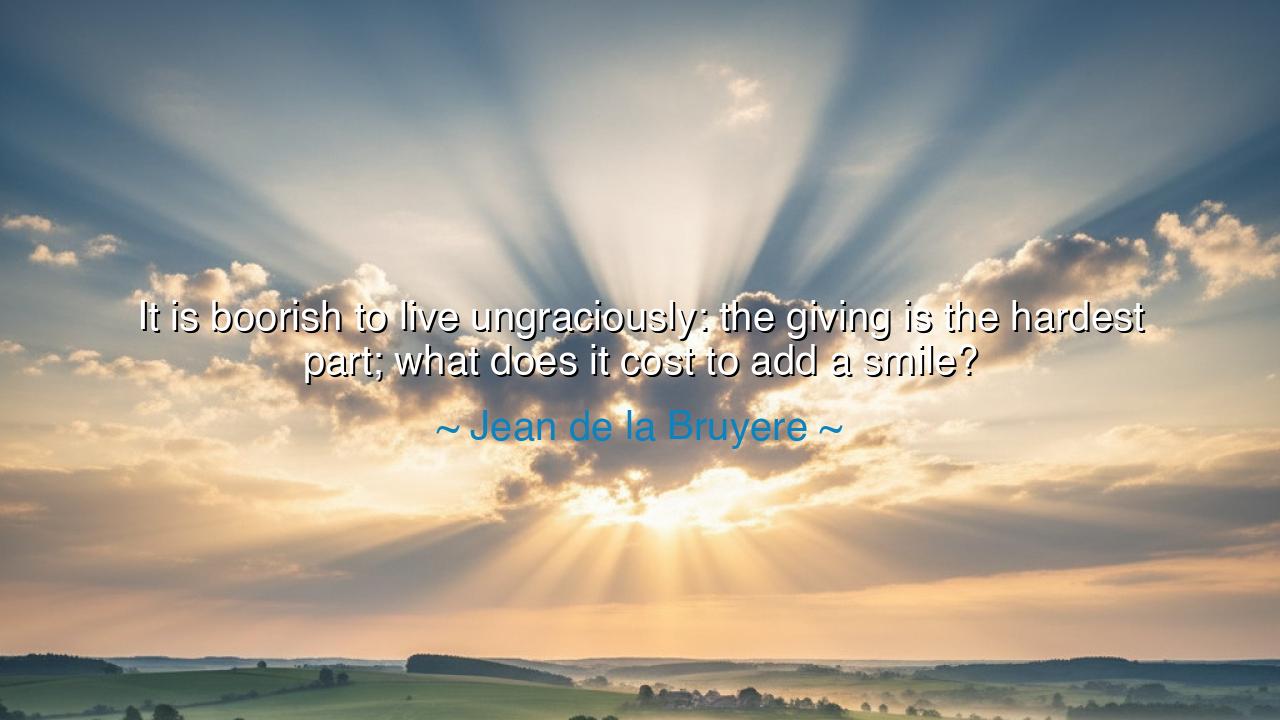
It is boorish to live ungraciously: the giving is the hardest
It is boorish to live ungraciously: the giving is the hardest part; what does it cost to add a smile?






Jean de la Bruyère, sharp observer of the human soul and one of France’s great moralists, once declared: “It is boorish to live ungraciously: the giving is the hardest part; what does it cost to add a smile?” In these few words, he lays bare a timeless truth: that generosity, without grace, is incomplete. To give without warmth is to offer bread made of stone; to bestow charity without kindness is to strip it of its soul. For the act of giving demands effort, sacrifice, and courage, yet the smile, which costs nothing, transforms it into a gift that nourishes not only the body but the heart.
The ancients too knew the difference between cold charity and gracious giving. Aristotle, in his Nicomachean Ethics, spoke of liberality—the virtue of giving not only what is due, but giving it with dignity and joy. The Romans admired not merely the gift of coin, but the spirit of magnanimity with which it was delivered. For in truth, a harshly given gift enslaves, while a kindly given gift frees. La Bruyère reminds us that to fail in this is to live boorishly, as though blind to the subtler nobility that elevates man above brute instinct.
History gives us luminous examples. Consider St. Francis of Assisi, who did not merely give alms to the poor but greeted them with cheer, treating beggar and king alike as brother. His smile was as much a gift as the cloak he placed upon their shoulders, for it restored dignity and reminded them of their worth. Contrast this with the wealthy nobles of Versailles in La Bruyère’s own time, who might toss coins to the needy but with a sneer of contempt or a face turned away. One gift bound hearts; the other deepened humiliation.
Mark this well: the smile is not a trivial adornment, but the seal of sincerity upon the act of giving. A man may labor to provide food for the hungry, yet if he does so with bitterness or pride, he has given only half. But if he gives with a gentle smile, he has given hope, companionship, and love, which are worth more than gold. The hardest part of charity is often the sacrifice itself, but La Bruyère reminds us that the softening touch of grace costs nothing, and yet multiplies the gift a hundredfold.
In truth, even the smallest acts of kindness are transformed by a smile. A word of encouragement, when spoken coldly, may feel like obligation. But the same word, offered with warmth, can change the course of another’s day. So too in the household, in the workplace, and in the marketplace of daily life: to offer not only what is required, but to offer it graciously, is to live as one who understands the full measure of humanity.
Practical wisdom flows from this: when you give, whether it be money, time, or service, do not give grudgingly. Add the smile, the warmth, the word of kindness that proves your heart is present in the act. For true nobility lies not only in generosity, but in graciousness. Practice this daily—in the smallest exchanges, in the way you greet the stranger, in the way you answer the weary soul before you.
Therefore, O seeker, let Jean de la Bruyère’s counsel be your guide. Do not live ungraciously, for life without warmth is barren, and generosity without gentleness is hollow. Remember always that the giving may cost you much, but the smile costs nothing—and yet, it is this that often lingers longest in the memory of those you have touched. For in the end, it is not only the hand that gives which is remembered, but the light in the eyes, the kindness in the voice, and the smile that made the gift whole.






AAdministratorAdministrator
Welcome, honored guests. Please leave a comment, we will respond soon